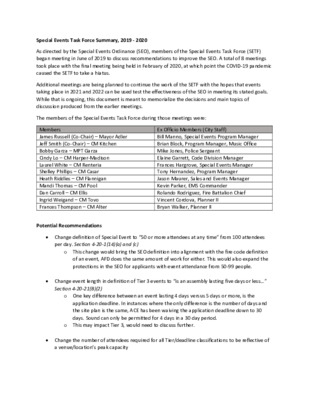SETF Prior Work Summary — original pdf
Backup

Special Events Task Force Summary, 2019 ‐ 2020 As directed by the Special Events Ordinance (SEO), members of the Special Events Task Force (SETF) began meeting in June of 2019 to discuss recommendations to improve the SEO. A total of 8 meetings took place with the final meeting being held in February of 2020, at which point the COVID‐19 pandemic caused the SETF to take a hiatus. Additional meetings are being planned to continue the work of the SETF with the hopes that events taking place in 2021 and 2022 can be used test the effectiveness of the SEO in meeting its stated goals. While that is ongoing, this document is meant to memorialize the decisions and main topics of discussion produced from the earlier meetings. The members of the Special Events Task Force during those meetings were: Members James Russell (Co‐Chair) – Mayor Adler Jeff Smith (Co‐Chair) – CM Kitchen Bobby Garza – MPT Garza Cindy Lo – CM Harper‐Madison Laurel White – CM Renteria Shelley Phillips – CM Casar Heath Riddles – CM Flannigan Mandi Thomas – CM Pool Dan Carroll – CM Ellis Ingrid Weigand – CM Tovo Frances Thompson – CM Alter Potential Recommendations Ex Officio Members (City Staff) Bill Manno, Special Events Program Manager Brian Block, Program Manager, Music Office Mike Jones, Police Sergeant Elaine Garrett, Code Division Manager Frances Hargrove, Special Events Manager Tony Hernandez, Program Manager Jason Maurer, Sales and Events Manager Kevin Parker, EMS Commander Rolando Rodriguez, Fire Battalion Chief Vincent Cordova, Planner II Bryan Walker, Planner II Change definition of Special Event to “50 or more attendees at any time” from 100 attendees per day. Section 4‐20‐1(14)(a) and (c) o This change would bring the SEO definition into alignment with the fire code definition of an event, AFD does the same amount of work for either. This would also expand the protections in the SEO for applicants with event attendance from 50‐99 people. Change event length in definition of Tier 3 events to “is an assembly lasting five days or less…” Section 4‐20‐21(B)(2) o One key difference between an event lasting 4 days versus 5 days or more, is the application deadline. In instances where the only difference is the number of days and the site plan is the same, ACE has been waiving the application deadline down to 30 days. Sound can only be permitted for 4 days in a 30 day period. o This may impact Tier 3, would need to discuss further. Change the number of attendees required for all Tier/deadline classifications to be reflective of a venue/location’s peak capacity o City staff has added a question to the AB+C portal application that asks to estimate the max daily attendance and the max anticipated attendance at any one time. Now both are captured which gives AFD a better picture of the anticipated occupancy. Topics for Additional Discussion Change requirement that notification goes out within 10 days after ACE issues a preliminary recommendation Section 4‐20‐33(C). almost a year out. o Means the notification has to be sent out right away, sometimes applications come o Need to find way to give appropriate time for notices while also avoiding bringing conflicts to City Council within 30 days of the event. Add preliminary recommendations within 10 days for Tier 2 events o Staff have indicated that this may not be logistically feasible Create a more streamlined, comprehensive special events application with all potential forms and prepopulated information from previous applications o City staff are currently working to consolidate and improve the application and forms with an emphasis on electronic submittal for all documents. Review requirements for sustainability reports Have a post‐event AMANDA form filled out by applicant and ACE departments to provide more comprehensive data/reports. o City staff are currently working to create post event evaluations for both City staff and applicants. The City evaluation will contain the consolidated notes from ACE departments and be available to the applicant. Determine what after‐event data SETF thinks should be collected for reports o City staff will create automated reports based off this discussion. Implement a “late”, “expedited”, or “additional resource” fee for special event applications in the Tier 3 category Offer more educational tools/resources for organizers to follow notification best practices. o City staff are working to develop additional guides and tutorials Streamline the waste reduction/management requirements to allow exemptions for events in venues/locations in compliance with the URO or other City approved waste management/diversion plans.